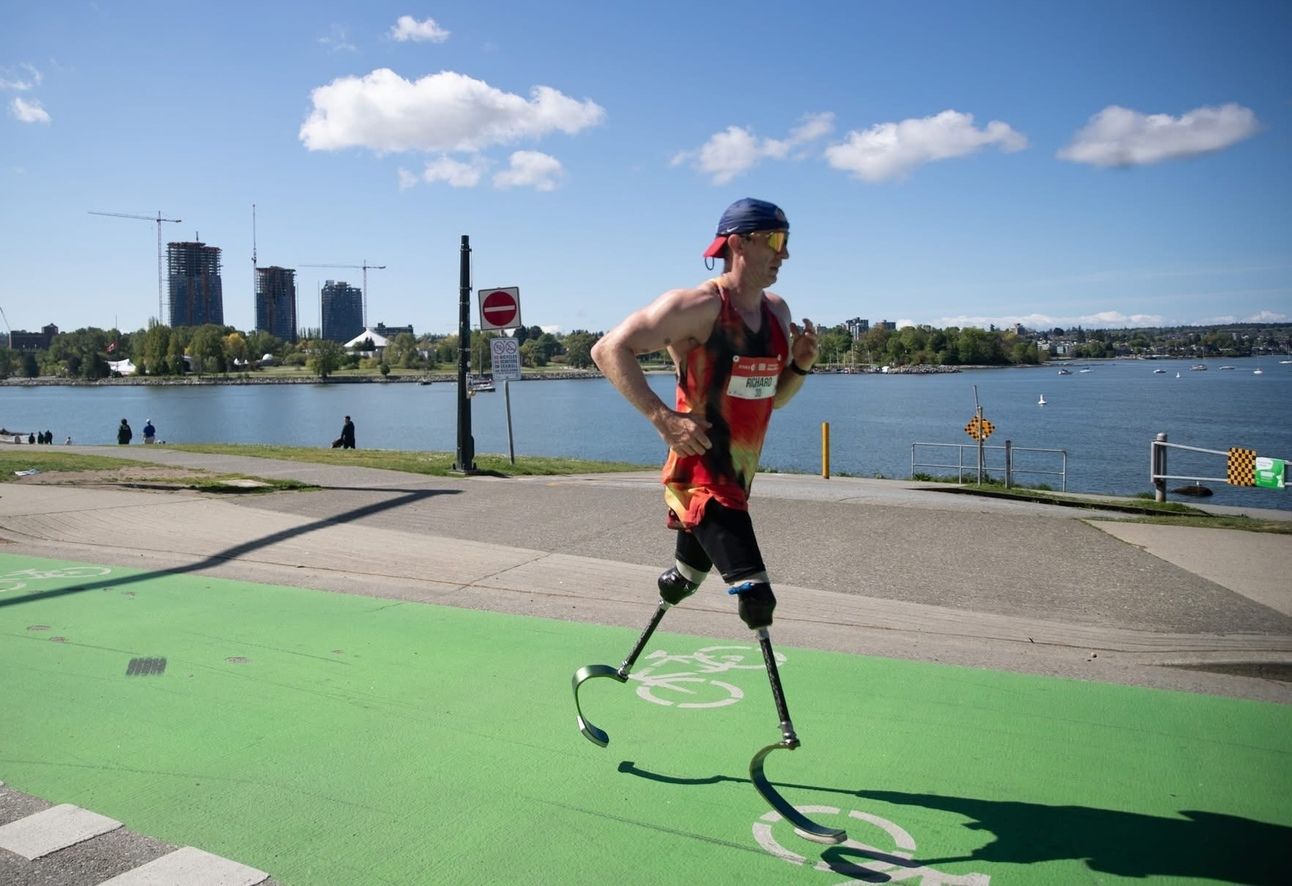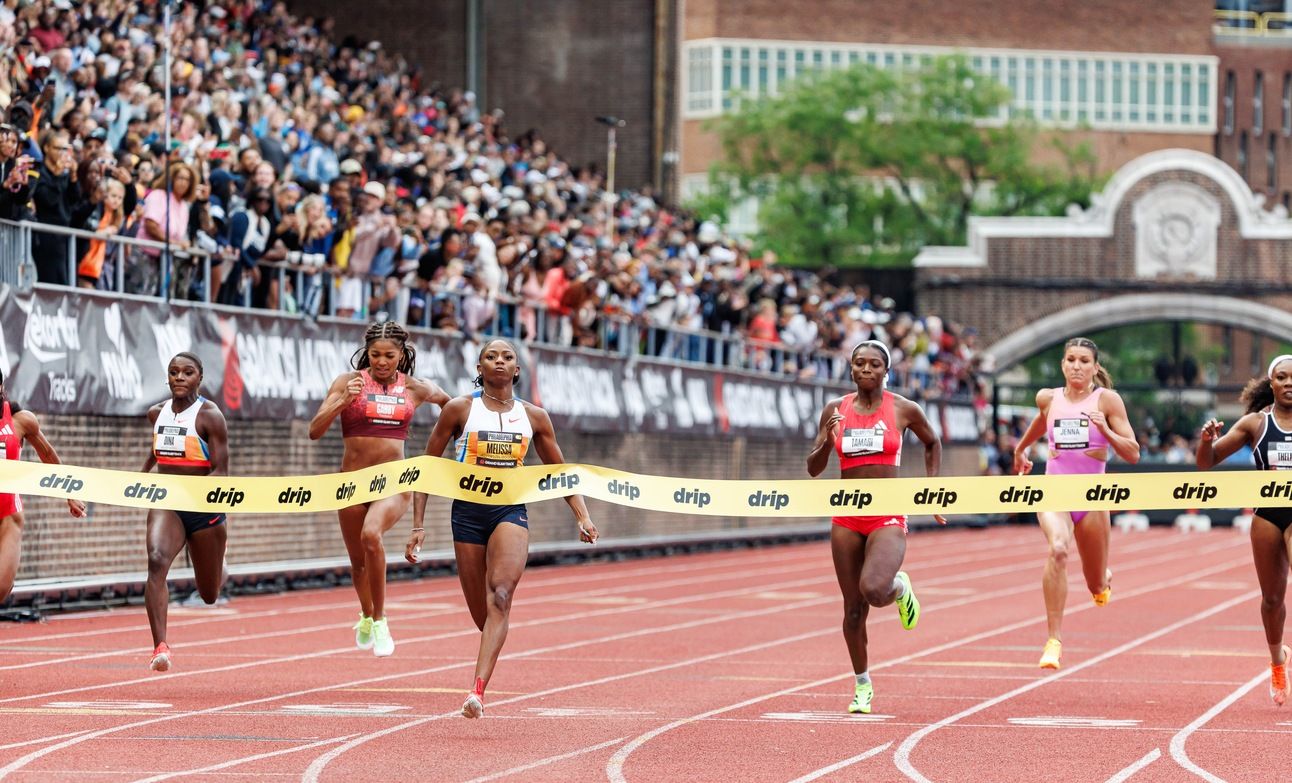
Hello! Welcome back to The Footprint, and happy Friday. We made it.
Last night at the 2025 Tribeca Festival, New York Road Runners – the organization behind the New York City Marathon – screened its first short film. Final Finishers tells the kind of inspiring stories you find towards the back of the pack.
I’ll be writing about it soon. But in focusing on all the different people who toe the start line of a marathon, and all the different paths they took to get there, rather than obsessing about the very fastest, this documentary strikes me as the kind of thing many runners (including the subject of our interview this week) are crying out for.
📬 Edition #19: British Paralympian Richard Whitehead on the power of showing up, as he aims to run 20 marathons in 2025 …and Grand Slam Track abruptly shuts down early for the season.
Was this email forwarded to you? Sign up here.
Richard Whitehead Takes A Victory Lap

Courtesy of Richard Whitehead
Richard Whitehead is a four-time world champion and two-time Paralympic champion sprinter. But make no mistake: the marathon is his main event.
The British athlete, who ran his first marathon two decades ago, twice broke the world record for a marathon with bilateral knee amputations last year – finishing Chicago in 2:41:36 last October.
As he prepares to run his hundredth marathon in November, he reflected in an interview on why he’s run so many races, so fast, for so long. “I just see a benefit of showing up,” he said.
Marathons are powerful, according to Whitehead; not just because of what they are, but who they can reach. While watching someone run 26.2 miles is inspiring in and of itself, big road marathons – unlike other sporting championships, confined to arenas where the cheapest seats cost hundreds – are open to anyone who chooses to lean out a window, or stand on a street corner.
At 90 marathons and counting, Whitehead has been part of this show. In his view, too many directors – those who organize, promote and broadcast the performances – often shine the spotlight on the wrong parts of the stage.
Some international races are fixated on the men they assemble at the very front of the pack, Whitehead said. “Nobody really is interested in that, to be honest," he suggested. “It’s a picture at the finish, and that’s it.
“It doesn’t have a massive impact on the running community, where some of the other runners – who have done hundreds of marathons, or big ultra marathon challenges, or they’ve done it for a cause and raised lots of money – really do have a bigger impact on the running community.”
Yes, marathons can inspire people – but to do what? “It’s not just about selling shoes on the winning men and women,” said Whitehead, but demonstrating to anyone that they can “incorporate running into... every day life,” no matter the obstacles they might face.
“A lot of people in the disability community feel like running isn’t for them. The opportunities aren’t really showcased to people with disabilities,” he added. “I don’t think running communicates to the disabled community enough.”
Leading by example, Whitehead set himself a challenge in 2025: run 20 marathons on the road back to New York, where he ran his first back in 2004. He will return in November, 21 years later, to run his hundredth.
Boston, London and Paris have been among the stops so far; he’ll head to Norway for the 91st next weekend. At each race, he hopes to “change people’s perception” of what you can and can’t do as a runner – and persuade organizers to reassess “what inclusivity looks like” in their events.
“Hopefully people see that I’m not just jogging races,” said Whitehead, 48. “I’m going for it. I’ve done three of them in 2:40-something. The rest of them, apart from three, have been under three hours.”
Born and raised in Nottingham, UK, with a double through-knee congenital amputation, he wants to prove it’s possible to overcome barriers. It’s one thing to know this, in theory; he wants people to see it, in practice.
“I still don’t get the respect I deserve for the marathon,” said Whitehead. People don’t realize the energy it takes to run 26.2 miles as a double amputee, he added, let alone at a record-breaking pace.
So this is also a bid by Whitehead to underline what he believes: that he is one of the best, and fittest, Paralympic athletes “that’s ever been”.
“Let’s showcase that,” he said. “Let’s be ballsy enough to actually say that I don’t think there’s another amputee runner in track and field that’s done anything like what I’ve done.
“Who’s broke world records on the track, and then broke them on the road? Who’s run over 20 years, and been successful through that career? Nobody. You go through all the amputees that have raced – whether it’s international runners, or whether it’s ones in Great Britain, I don’t think they’ve emulated what I’ve done.”
This latest challenge is his victory lap: a chance to show the world that he hasn’t just completed the marathon, but conquered it, time and again.
New York, where the curtains came up all those years ago, would be the logical place to take a bow. Will it be his last? “I’ll race like it’s my last marathon; I always say that. I’ve never committed past these 20,” he said. “We’ll see.”
AROUND AND ABOUT
💭 Ultra cracks | Ultrarunning culture is increasingly fragmenting, Matt Walsh writes in Trailmix, after a hyped race went uncovered by the sport’s dominant platforms
⏱️ Kipyegon’s kit | Faith Kipyegon will wear an aerodynamic speed suit, a lightweight sports bra made of 3D-printed performance material, and custom track spikes for her bid this month to become the first woman to break the four-minute mile
🏅 Record breaker | The US high school 800m record fell for the first time in 29 years last weekend. Cooper Lutkenhaus, 16, won the Brooks PR Invitational in 1:46.26, Theo Kahler reports in Runner's World
Grand Slam Track Shuts Down Early

Matt Pendleton for Grand Slam Track
Grand Slam Track is done – for now. The ambitious league abruptly announced yesterday that its fourth and final meet of the year, due to take place in LA later this month, was canceled.
Founder Michael Johnson, who stressed the decision was “not taken lightly,” hinted it was due to financial concerns. “The global economic landscape has shifted dramatically in the past year, and this business decision has been made to ensure our long-term stability as the world’s premier track league.”
Many who headed to the last meet in Philadelphia earlier this month, after largely empty stands in Kingston and a relatively small TV audience for Miami, turned up asking the same question: is this working?
Inside Franklin Field, which has capacity for some 70,000 fans, the answer wasn’t clear cut.
The races were great. The format worked. The atmosphere among the several thousand spectators on the home straight was electric. But it was clear Grand Slam Track – which promised to revolutionize the sport, and take it to a new level – had a long way to go.
“Our attention is now on 2026,” said Johnson. Hopefully it gets there.
RECENT EDITIONS
#18 Bridging The Gap | Calli Hauger-Thackery and Nick Hauger on stepping up a level
#17 No End In Sight | NFL veteran Justin Britt on the freedom of running
#16 What Running Should Be | former pro Serena Burla returns to racing
Thanks for reading! Let me know what you think: just hit ‘reply,’ or email me.
Have a great weekend.
– Callum